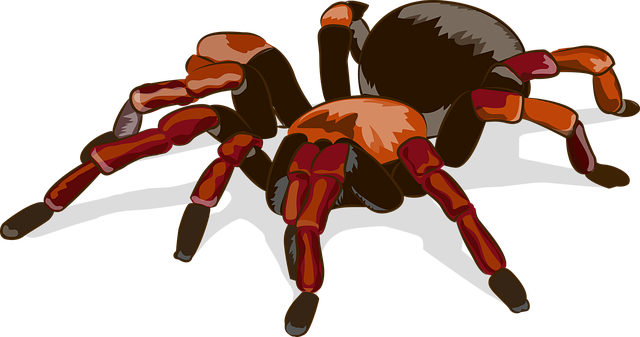Spider infestations require proactive measures. Early detection through signs like webs and visible spiders is key. Professional spider control offers safe, effective solutions combining targeted treatments, long-term prevention strategies (e.g., barrier systems), and eco-friendly practices (natural repellents). These methods provide residential and commercial spaces with comfortable, secure environments while minimizing chemical exposure and ecosystem disruption. Simple tips for homeowners include regular inspections and natural deterrents, while commercial spaces need tailored strategies like maintenance checks and physical barriers, benefiting from professional ongoing monitoring and customized solutions.
In many parts of the world, spiders are more than just arachnids lurking in the corner; they can cause significant distress and health concerns. Understanding spider infestations and their impact is crucial to adopting effective prevention strategies. This article delves into professional spider control methods, offering eco-friendly solutions for both residential and commercial spaces. Discover practical tips on spider-proofing your home or office, ensuring a safe environment without resorting to harsh chemicals.
Understanding Spider Infestations and Their Impact
Understanding Spider Infestations and Their Impact
Spider infestations can be a significant concern for both residential and commercial properties, causing distress and negatively impacting the environment. Professional spider control services play a vital role in addressing these issues effectively. Recognizing the signs of a spider infestation early is crucial for prevention. Webs, visible spiders, or egg sacs are clear indicators that professional intervention may be needed.
Eco-friendly spider prevention solutions are gaining popularity as people become more conscious of their environmental impact. These methods include using natural repellents like citrus oils, mint, and cedarwood, along with structural changes to reduce entry points. Spider-proofing your home or commercial space involves sealing cracks, maintaining proper ventilation, and keeping areas clean and clutter-free. By combining professional spider control with these eco-conscious prevention tips, it’s possible to manage and minimize spider infestations while promoting a healthier environment.
Professional Spider Control: The Expert Approach
Professional Spider Control offers an expert approach to spider infestation prevention, tailored to both residential and commercial settings. These specialized services employ advanced techniques and eco-friendly solutions to ensure effective spider control without causing harm to people or the environment. Professional exterminators are trained to identify various spider species, understand their behaviors, and deploy targeted treatments.
Unlike DIY methods that may only provide temporary relief, professional spider control services focus on long-term prevention by addressing entry points, eliminating existing webs and nests, and implementing barrier systems. They also utilize natural repellents and non-toxic chemicals to manage spider populations safely. Such tailored solutions not only rid spaces of spiders but also help maintain a comfortable and secure environment for residents or employees.
Eco-Friendly Solutions for Effective Spider Prevention
Many traditional methods of spider prevention rely on toxic chemicals, which can be harmful to both humans and the environment. Fortunately, there are numerous eco-friendly solutions available for effective spider control that don’t compromise your health or the planet’s well-being. Professional spider control services often employ these innovative techniques as part of their residential or commercial spider prevention tips.
One such approach is spider-proofing your home or business through a combination of physical barriers and strategic placement of essential oils or natural repellents. This can include sealing entry points, using fine mesh screens, and maintaining a clean environment. Additionally, using eco-friendly pest control for spiders involves targeting specific species with tailored solutions, avoiding unnecessary treatments, and promoting the natural predators that keep spider populations in check. These methods not only reduce exposure to harmful chemicals but also contribute to a more sustainable and balanced ecosystem.
Implementing Residential and Commercial Spider-Proofing Measures
Implementing effective spider prevention strategies is essential for both residential and commercial spaces, ensuring a comfortable and safe environment for occupants while promoting ecological balance. Professional spider control services offer specialized knowledge and tools to address spider infestations promptly and humanely. These experts employ eco-friendly spider prevention solutions, such as sealing entry points, removing potential food sources, and using non-toxic repellents, minimizing the impact on the surrounding ecosystem.
For homeowners, residential spider prevention involves regular inspections, maintaining cleanliness, and identifying common hiding spots like dark corners and attics. Simple yet effective tips include keeping doors and windows closed, promptly cleaning up crumbs or spills, and using natural deterrents like citrus scents or plant-based oils. Commercial spaces require tailored strategies, with regular maintenance checks, thorough cleaning protocols, and the implementation of physical barriers to prevent spiders from entering. Professional commercial spider control services are invaluable for large-scale operations, offering ongoing monitoring and customized solutions to mitigate spider presence without resorting to harsh chemical treatments.
In addressing spider infestations, a balanced approach that combines understanding, professionalism, and eco-consciousness offers the most effective and sustainable solution. By integrating professional spider control methods with eco-friendly prevention tips, both residential and commercial spaces can be spider-proofed while minimizing environmental impact. Remember that proactive measures, such as proper sanitation, sealing entry points, and using natural repellents, are key to preventing these eight-legged intruders from taking over your spaces.
